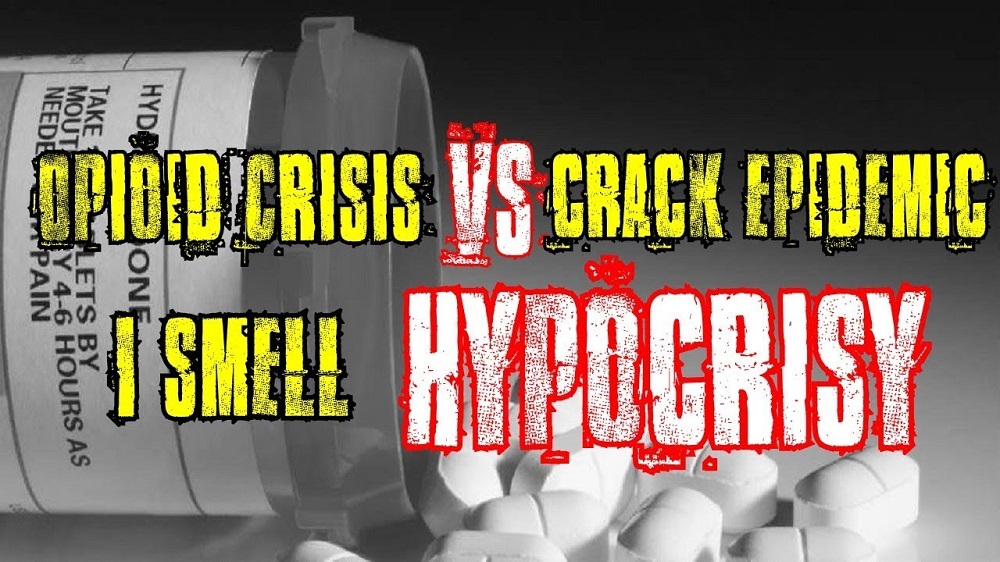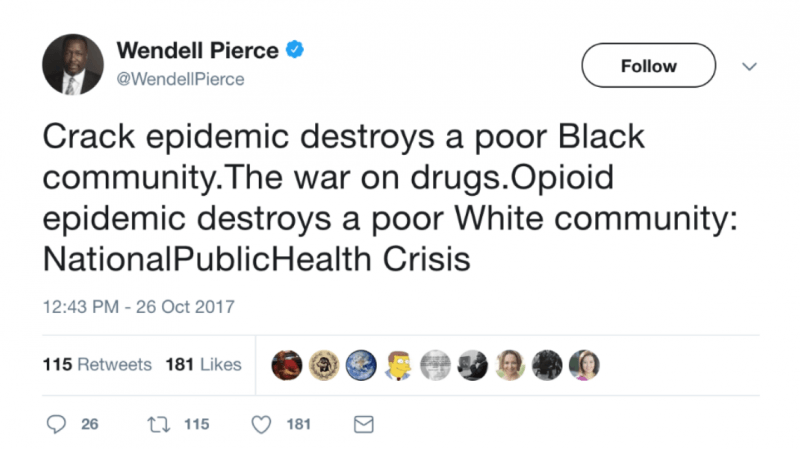
I was born in the mid-1980s in Los Angeles, CA. I had a fairly decent childhood in that while we were poor, my family was together. My parents were married and my two younger brothers and I were good kids who didn’t get into any trouble. I had nothing as a child, but I was happy. However, despite the assurance I felt as a young girl who was lucky enough to reside in a home with both of her parent for the first decade of my life, there was a harsh reality in my community that I was constantly made aware of – the war on drugs.
It is a term that just about everyone has heard. In fact, the phrase invokes a feeling of danger and urgency. I saw the men of my poverty-stricken neighborhood run up on by police, their pockets searched and their bodies stuffed into the back seat of squad cars. It was commonplace in my hood; so much so that I didn’t really think twice about it then. In my little mind, there was a war raging. The bad men and women who did crack needed to be punished for their willingness to do anything to find their fix. As an adult, I see that those who fell victim to the master plan created by higher-ups to stagnate and destroy the black community (which most certainly included sending crack into our communities) were lost people with addictions that needed to be addressed, not penalized. That’s why Donald Trump’s declaration of a national opioid abuse epidemic doesn’t sit well with me.
The war on drugs was a failure and a success. Morally it debilitated people of color (POC). Politically it satisfied the need that white politicians had to control black and brown people. It was seen as an adequate fix to a growing crack problem that spread throughout minority communities across the country like cancer. And here we are today, dealing with an epidemic just as debilitating and the terminology used is not “war,” inciting a fighting feeling, but rather a “crisis” communicating the need to be sympathetic and helpful of those addicted. When it all comes down to it, black people strung out on crack didn’t receive the chance to find healing the way white opioid users are getting thanks to government efforts. That’s a narrative worth exploring.
How is the opioid crisis different from the crack epidemic?” Well, other than the fact that the former mostly affects white people and the latter, black and brown people, it’s not. Yet the disparity in the compassion and support for both issues that millions of Americans have faced at different times in history is disappointing. There is no denying that the reaction to places like Baltimore, MD, whose black community was destroyed by the pumping of crack into their neighborhoods, garnered a very different outcome than that which we’ll see with the opioid situation. That’s because when understanding and support should have been given to those addicted to the substance, retaliation and criminalization was the method used to deal with it. We are still feeling the effects of that today, with more than 2.3 million black people incarcerated; a whopping 34% of the total correctional population. Black people and Latinos make up 32% of the American population and yet are 56% of incarcerated individuals. Does that sound right to you?
I am overwhelmed by the message that Trump and other Republicans that see their opioid declaration as a harrowing act is sending to marginalized minorities. It’s another slap in the face by rich white people whose only ability for compassion is for their own kind. Were the POC dealing with their disease addiction not worthy of the benefit of the doubt?
Being the Pisces that I am, a part of me argued that the reason the opioid crisis is getting the attention it has gotten is because the higher ups have learned their lesson. I wanted to believe that they are addressing the issue by declaring a national emergency because they saw how their negative reactions to the crack epidemic damaged people and destroyed lives. I maintained, just for a split second, that Trump’s approach is a “lesson learned” decision that came from a place of equality and genuine concern for all people. But then I immediately woke up from that dream to realize this – I am damn right that Trump and other white folks’ reaction to the opioid situation is different from that of the crack situation because they would never do to their fellow white man what they did to POC. They would never levy such harsh punishments and connect such dogwhistle theory stereotypes to their own because they knew how it would and see now how it does affect us. And so they have no choice but to take care of those fiending for and dying from opiates, which goes to show that there is always a different reaction to things when those most affected are white. From how they framed the victims of the crack epidemic – black, sickly, dangerous, thugs and “super-predators” – to how they are petitioning a national call for compassion and action, everything about the opioid declaration is classist.
It is a good thing that Trump wants to help the people who can’t help themselves because they are weighed down by their need to medicate with opioids. And if he really follows through to make another one of his promises happen (there are rumors that it’s probably just lip service. He hasn’t really given any money to initiate anything) it will probably be in the top two of the highlights of his term. But in the midst of the potential good that could come from this initiative, I can’t help but feel the looming reality of the pattern of treatment by our government that POC have endured for centuries. It’s nothing new to be neglected and cast off for us. It just happens in different, most times but not always, less openly direct ways. When it comes down to it, race affects the response of those in power to these kinds of situations.
I have seen crack take down a lot of people. I have seen it first hand leave black men in a cycle of continued arrests, prison terms, and ultimately, wasted time. I can’t help but wonder how things would have been different if crack-cocaine addiction was treated as such, an addiction, and not just another way that black people take up space in a white man’s world.



